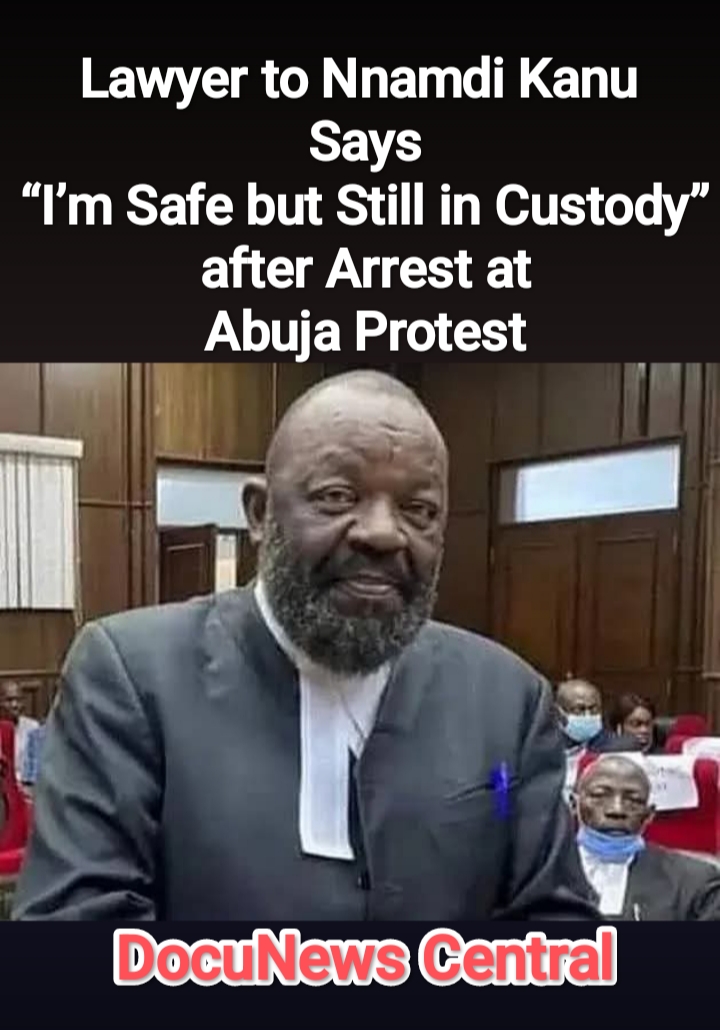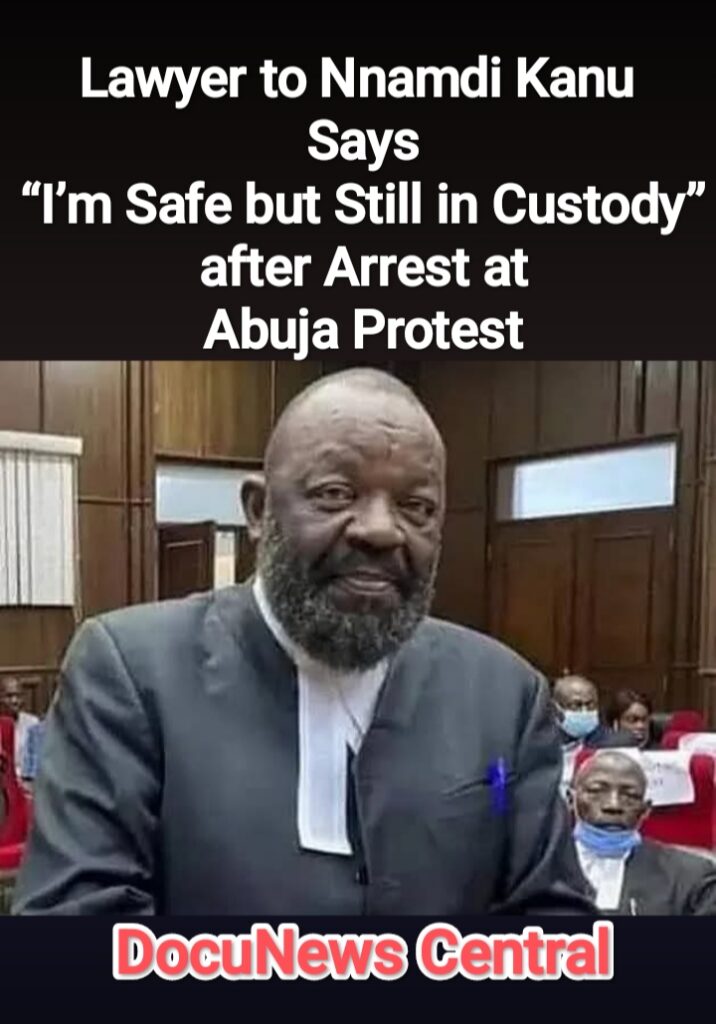

During the #FreeNnamdiKanu demonstration in Abuja, Barrister Aloy Ejimakor confirms he remains detained at Kuje Prison as authorities respond to growing unrest.
Abuja, Nigeria — Tension heightened in Nigeria’s capital on Monday as Nnamdi Kanu’s lawyer, Aloy Ejimakor, confirmed that he is still being held at Kuje Prison, 24 hours after his arrest during the #FreeNnamdiKanu protest. The protest was organized to demand the immediate release of Kanu, the leader of the Indigenous People of Biafra (IPOB).
Speaking from custody, Ejimakor reassured his supporters that he was safe but still in detention. His brief message, “I’m safe but still in custody,” spread quickly across social media platforms and news outlets. The development has drawn national and international attention, fueling fresh discussions on human rights, legal independence, and freedom of assembly in Nigeria.
Arrest at the Protest: What Really Happened
According to reports by Premium Times Nigeria, Ejimakor announced his arrest via social media, stating: “We have just been arrested. Myself, Prince Emmanuel, and others are at the FCT Command CID.”
He and several other protesters, including human rights activist Omoyele Sowore, were detained while leading a peaceful march in Abuja. The protest, which began at the Unity Fountain, was aimed at pressuring the government to comply with multiple court rulings that have ordered Kanu’s release since 2021.
The Guardian Nigeria also reported that Ejimakor confirmed his detention in a follow-up message, assuring his colleagues that he was “safe and sound” despite being denied bail. He maintained that his arrest would not deter him from seeking justice for his client.
The Protest and Government Response
The protest was part of the wider #FreeNnamdiKanu movement. Supporters of Kanu have consistently accused the federal government of ignoring court orders and violating his fundamental rights. Demonstrators chanted solidarity songs and waved flags, calling for freedom and fairness.
However, police authorities declared the protest “unlawful,” stating that it posed a threat to public order. Security forces deployed heavily around Abuja’s city center. Reports from Reuters and Associated Press (AP) revealed that officers used tear gas, water cannons, and heavy barricades to disperse protesters. Eyewitnesses also claimed they heard live bullets during the confrontation.
While the Nigerian police denied firing live bullets, several demonstrators alleged otherwise, saying some were injured in the chaos. The conflicting reports have intensified calls for an independent investigation.
Legal Implications and Rights Concerns
The detention of a lawyer representing a political detainee has sparked debate among legal experts and civil rights advocates. According to analysts, Ejimakor’s arrest raises concerns about the sanctity of legal representation and the right to peaceful protest.
Legal observers argue that the arrest of a counsel in the line of duty may discourage other lawyers from taking on politically sensitive cases. The Nigerian Bar Association (NBA) is reportedly monitoring the case, as many members see it as a direct affront to the independence of the legal profession.
Beyond legal ethics, there is also a broader constitutional question. Section 40 of Nigeria’s Constitution guarantees the right to peaceful assembly, while Section 36 assures every citizen the right to fair hearing and legal representation. Ejimakor’s detention, according to some activists, infringes on both principles.
Reaction from Civil Society and the Public
Following the news of his arrest, various civil rights groups and human rights organizations condemned the action. The Socio-Economic Rights and Accountability Project (SERAP) demanded his immediate release, describing the arrest as “an intimidation tactic against the pursuit of justice.”
Social media platforms have also been flooded with solidarity messages under hashtags like #FreeEjimakor and #FreeNnamdiKanuNow. Many Nigerians online expressed anger, arguing that the government’s actions show disregard for democratic values.
Meanwhile, IPOB supporters across the Southeast have been urged to remain calm and avoid violent demonstrations. Ejimakor’s associates have emphasized that their struggle remains peaceful and legal.
Nnamdi Kanu’s Ongoing Detention and Court Battles
Nnamdi Kanu, the IPOB leader, has been in detention since June 2021 after he was extradited from Kenya under controversial circumstances. His arrest sparked international outrage and condemnation from human rights groups, who described it as an “extraordinary rendition.”
Over the years, several Nigerian courts have ruled for his release. However, the federal government has refused to comply, citing national security reasons. Kanu faces multiple charges, including terrorism and treason, though his supporters insist the charges are politically motivated.
Reuters recently reported that Kanu’s trial is now before the fourth judge since his detention began, raising concerns over delays and judicial inconsistency. Despite repeated adjournments, his legal team remains committed to pursuing justice.
Inside Kuje Prison: Conditions and Controversy
The Kuje Correctional Facility in Abuja, where both Kanu and Ejimakor are being held, has a history of overcrowding and poor living conditions. The prison made headlines in 2022 after a major terrorist attack led to several inmates escaping. Authorities later assured Nigerians that Kanu was safe and had not been harmed.
Sources familiar with the facility describe it as secure but harsh. Detainees face strict restrictions, limited access to visitors, and limited communication privileges. Despite this, Ejimakor managed to send out a message assuring supporters of his safety, a move that strengthened public confidence in his resilience.
Broader Implications for Nigeria’s Democracy
The incident has raised deeper questions about Nigeria’s democratic trajectory. Arresting protesters and detaining lawyers can set dangerous precedents. If unchecked, such actions could erode citizens’ trust in institutions meant to protect justice and rights.
Political analysts believe this case will serve as a litmus test for Nigeria’s commitment to the rule of law. As one Abuja-based legal analyst stated, “A democracy that arrests a lawyer for defending a client is flirting with authoritarian tendencies.”
Moreover, the ongoing conflict between IPOB supporters and the federal government continues to threaten national unity. Many argue that dialogue, not force, is the only sustainable path to peace and reconciliation.
Government and Security Reactions
Police officials have defended their actions, insisting that they acted within the law to prevent violence. In statements released by the Federal Capital Territory (FCT) Command, the police described the protest as “unauthorized” and said their intervention was necessary to prevent a breakdown of law and order.
Despite the explanations, public confidence remains low. Many Nigerians are demanding transparency, including video evidence of what transpired during the protest. Civil rights lawyers are also calling for legislative oversight to ensure accountability in future protest management.
International Reactions and Monitoring
International human rights organizations, including Amnesty International, have continued to monitor developments surrounding Nnamdi Kanu’s detention. They have repeatedly called on the Nigerian government to respect court orders and release him unconditionally.
Foreign news outlets such as AP News and Reuters have given the story global attention. Their coverage highlights Nigeria’s balancing act between maintaining national security and upholding democratic freedoms.
What to Expect Next
Several questions remain unanswered. Will Ejimakor face charges, or will he be released unconditionally? How will this affect Kanu’s trial? And most importantly, will Nigeria’s judiciary stand firm in the face of executive pressure?
Observers expect an official statement from the Ministry of Justice in the coming days. Meanwhile, supporters are planning another peaceful rally next week to demand both men’s release. Civil society organizations have urged restraint, encouraging protesters to stay lawful and peaceful.
Conclusion
As Nigeria continues to grapple with issues of justice, equality, and democracy, the detention of Aloy Ejimakor serves as a powerful reminder of the challenges facing the nation’s legal system. His calm message from behind bars—“I’m safe but still in custody”—has now become symbolic of the struggle for freedom and the rule of law in modern Nigeria.
The story of Kanu, Ejimakor, and the ongoing protests represents more than a legal battle; it reflects a larger conversation about governance, accountability, and the future of Nigeria’s unity. While many await clarity from authorities, one thing is certain: the eyes of the nation, and indeed the world, remain fixed on Abuja.
Reported by DocuNews Central. Copyright reserved, DocuNews Central.






